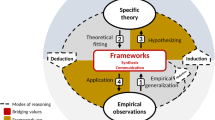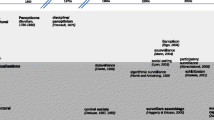Abstract
What are “good” kinds of archival evidence for theorizing? Surprisingly, the word archive and discussions of the archival process rarely appear in methods textbooks or discussions of methods in historical sociology. Yet, much recent historicized sociology relies upon documents left over by a small group of actors to make large-scale claims. To address this oversight, we leverage the evidentiary strengths of qualitative sociology and translate them for historical sociology. Our central argument is that three kinds of archival evidence are likely to produce generalizable claims: positive contingency, learning by mistakes, and plausible alternatives. Examples are illustrated with the cases of jail overcrowding in Los Angeles County, anti-redlining policy in the Federal Reserve, and immigration policy in the Dillingham commission.
Similar content being viewed by others
Notes
As we will discuss later, one exception is Ermakoff (2019), who offers broad advice.
A description in Burawoy’s (1998: 19) closely related “extended case method” helps to clarify this point. The goal of this kind of theorizing is less “to seek out common patterns among diverse cases, so that context can be discounted…” and is instead found in “tracing the source of small difference to external forces… Here the purpose of the comparison is to causally connect the cases. Instead of reducing cases to instances of a general law, we make each case work in its connection to other cases.”
3/21/2006, Los Angeles County Board of Supervisors Meeting Transcript [here after date reported].
3/21/2006. County officials debated whether to terminate the contract in five meetings between 2/14/2006 and 8/1/2006; especially 2/21/06.
7/11/2006. Another similar exchanged occurred on 8/1/2006.
Bakstansky, Peter, and Ernest T. Patrikis. 1980. Meeting with Bronx and Brooklyn Community Representatives. Edited by Federal Reserve Bank of New York. New York: Federal Reserve Bank of New York.
Ibid.
Ibid.
Multiple authors. 1983. CRA Implementation Evaluation Report. New York: Archives of Federal Reserve Bank of New York.
References
Abbott, Andrew. 1988. Transcending general linear reality. Sociological Theory 6 (2): 169.
Adams, Julia. 2005. The familial state: Ruling families and merchant capitalism in early modern Europe. Ithaca: Cornell University Press.
Adams, Julia, Elisabeth Clemens, and Ann Orloff. 2005. Social theory, modernity, and the three waves of historical sociology. In Remaking modernity: Politics, history, and sociology, eds. Julia Adams, Elisabeth Clemens, and Ann Orloff, 1–74. Durham: Duke University Press.
Agamben, Giorgio. 2009. The signature of all things: On method. New York: Zone Books.
Becker, Howard. 1998. Tricks of the trade. Chicago: University of Chicago Press.
Benton-Cohen, Katherine. 2018. Inventing the immigration problem: The Dillingham commission and federal power in the progressive era. Cambridge: Harvard University Press.
Biernacki, Richard. 2012. Reinventing evidence in social inquiry: Decoding facts and variables. New York: Palgrave MacMillan.
Burawoy, Michael. 1998. The extended case method. Sociological Theory. 16 (1): 4–33.
Capoccia, Giovanni, and R. Daniel Kelemen. 2007. The study of critical junctures: Theory, narrative, and counterfactuals in historical institutionalism. World Politics 59 (3): 341–369.
Carruthers, Bruce. 1996. City of capital: Politics and markets in the English financial revolution. Princeton: Princeton University Press.
Chang, Gordon. 1997. Morning glory, evening shadow: Yamato Ichihashi and his internment writings 1942–1945. Redwood City: Stanford University Press.
Chibber, Vivek. 2003. Locked in place: State-building and late industrialization in India. Princeton: Princeton University Press.
Clemens, Elisabeth. 1997. The people’s lobby: Organizational innovation and the rise of interest group politics in the United States, 1890–1925. Chicago: University Chicago Press.
Clemens, Elisabeth. 2007. Towards a historicized sociology: Theorizing events, processes, and emergence. Annual Review of Sociology 33 (1): 527–549.
Dirks, Nicholas. 2015. Autobiography of an archive: A scholar’s passage to India. New York: Columbia University Press.
Dobbin, Frank. 1994. Forging industrial policy: The United States, Britain, and France in the railway age. Cambridge: Cambridge University Press.
Duneier, Mitchell, and Ovie Carter. 1999. Sidewalk. New York: Macmillan.
Emigh, Rebecca Jean. 1997. The power of negative thinking: The use of negative case methodology in the development of sociological theory. Theory and Society 26 (5): 649–684.
Ermakoff, Ivan. 2015. The structure of contingency. American Journal of Sociology 121 (1): 64–125.
Ermakoff, Ivan. 2019. Causality and history: Modes of causal investigation in historical social sciences. Annual Review of Sociology 45: 581–606.
Eyal, Gil. 2013. For a sociology of expertise: The social origins of the autism epidemic. American Journal of Sociology 118 (4): 863–907.
Foucault, Michel. 1982. The archaeology of knowledge. New York: Vintage Books.
Fourcade, Marion. 2011. Cents and sensibility: Economic valuation and the nature of “nature.” American Journal of Sociology 116(6): 1721–77.
Fox, Cybelle, and Thomas A. Guglielmo. 2012. Defining America’s racial boundaries: Blacks, Mexicans, and European immigrants, 1890–1945. American Journal of Sociology 118 (2): 327–379.
Freeland, Robert. 2001. The struggle for control of the modern corporation: Organizational change at general motors, 1924–1970. Cambridge: Cambridge University Press.
Garland, David. 2014. What is a “history of the present'”? On Foucault's genealogies and their critical preconditions. Punishment & Society 2014 (16): 365.
Gerteis, Joseph. 2007. Class and the color line: Interracial class coalition in the knights of labor and the populist movement. Durham: Duke University Press.
Ginzburg, Carlo. 1989. Clues, myths, and the historical method. Baltimore: Johns Hopkins University Press.
Göçek, Fatma. 2015. Denial of violence: Ottoman past, Turkish present, and collective violence against the Armenians, 1789–2009. Oxford: Oxford University Press.
Goertz, Gary, and James Mahoney. 2012. A tale of two cultures: Qualitative and quantitative research in the social sciences. Princeton: Princeton University Press.
Goffman, Erving. 1982. Interaction ritual: Essays in face-to-face behavior. New York: Pantheon.
Goldberg, Chad. 2007. Citizens and paupers: Relief, rights, and race, from the Freedmen’s bureau to workfare. Chicago: University Chicago Press.
Gould, Roger. 2000. Revenge as sanction and solidarity display: An analysis of vendettas in nineteenth-century Corsica. American Sociological Review 65 (5): 682–704.
Gross, Neil. 2018. Pragmatism and the study of large-scale social phenomena. Theory and Society 47 (1): 87–111.
Haydu, Jeffrey. 2008. Citizen employers: Business communities and labor in Cincinnati and San Francisco, 1870–1916. Ithaca: Cornell University Press.
Hirschman, Daniel, and Isaac Ariail Reed. 2014. Formation stories and causality in sociology. Sociological Theory 32 (4): 259–282.
Hunter, Marcus. 2013. Black citymakers: How the Philadelphia negro changed urban America. Oxford: Oxford University Press.
Ichihashi, Yamato. 1932. Japanese in the United States. Redwood City: Stanford University Press.
Jerolmack, Colin, and Shamus Khan. 2014. Talk is cheap: Ethnography and the attitudinal fallacy. Sociological Methods and Research 43 (2): 178–209.
Katz, Jack. 2002. From how to why: On luminous description and causal inference in ethnography; part 2. Ethnography 3 (1): 60–90.
King, Desmond. 2002. Making Americans: Immigration, race, and the origins of diverse democracy. Cambridge: Harvard University Press.
Koselleck, Reinhart. 2002. The practice of conceptual history: Timing history, spacing concepts. Redwood City: Stanford University Press.
Krippner, Greta R. 2005. The financialization of the American economy. Socio-economic review 3(2): 173–208.
Lara-Millán, Armando. 2014. Public emergency room overcrowding in the era of mass imprisonment. American Sociological Review 79 (5): 866–887.
Lange, Matthew. 2013. Comparative-historical methods. Thousand Oaks: Sage.
Lieberson, Stanley. 1991. Small ns and big conclusions: An examination of the reasoning in comparative studies based on a small number of cases. Social Forces 70 (2): 307–320.
Mahoney, James. 2004. Comparative-historical methodology. Annual Review of Sociology 30: 81–101.
Mahoney, James, and Gary Goertz. 2004. The possibility principle: Choosing negative cases in comparative research. American Political Science Review 98 (4): 653–669.
Mariampolski, Hyman, and Dana Hughes. 1978. The use of personal documents in historical sociology. The American Sociologist 13 (2): 104–113.
Medvetz, Thomas. 2012. Think tanks in America. Chicago: University of Chicago Press.
Moore, Barrington. 1966. Social origins of democracy and dictatorship. Boston: Beacon.
Pacewicz, Josh. 2020. What can you do with a single case? How to think about ethnographic case selection like a historical sociologist. Sociological Methods & Research. https://doi.org/10.1177/0049124119901213.
Perlmann, Joel. 2018. Americans classify immigrants: From Ellis Island to the 2020 census. Oxford: Oxford University Press.
Prasad, Monica. 2012. The land of too much: American abundance and the paradox of poverty. Cambridge: Harvard University Press.
Ray, Victor. 2019. A theory of racialized organizations. American Sociological Review 84 (1): 26–53.
Riley, Dylan. 2005. Civic associations and authoritarian regimes in interwar Europe: Italy and Spain in comparative perspective. American Sociological Review 70 (2): 288–310.
Skocpol, Theda, and Margaret Somers. 1980. The uses of comparative history in macrosocial inquiry. Comparative Studies in Society and History 22 (2): 174–197.
Skocpol, Theda. 1992. Protecting soldiers and mothers: The political origins of social policy in the United States. Cambridge: Harvard University Press.
Steinmetz, George. 2005. Introduction: Positivism and its others in the social sciences. In The politics of method in the human sciences: Positivism and its epistemological others, ed. George Steinmetz, 1–58. Durham: Duke University Press.
Stoler, Ann. 2009. Along the archival grain: Epistemic anxieties and colonial common sense. Princeton: Princeton University Press.
Su, Yang. 2011. Collective killings in rural China during the cultural revolution. Cambridge: Cambridge University Press.
Tichenor, David. 2002. Dividing lines: The politics of immigration control in America. Princeton: Princeton University Press.
Tilley, Charles. 1990. Coercion, capital and european States, AD 990-1990. Oxford: Blackwell.
Vaughan, Diane. 2004. Theorizing disaster, historical ethnography, and the challenger accident. Ethnography 5 (3): 315–347.
Vaughan, Diane. 2014. Analogy, cases, and comparative social organization. Theorizing in social science: The context of discovery: 61–84.
Vaughan, Diane. 2016. The challenger launch decision: Risky technology, culture, and deviance at NASA. Chicago: University of Chicago Press.
Voss, Kim. 1993. The making of American exceptionalism: The knights of labor and class formation in the nineteenth century. Ithaca: Cornell University Press.
Zeidel, Robert. 2004. Immigrants, progressives, and exclusion politics: The Dillingham commission, 1900–1927. DeKalb: Northern Illinois University Press.
Zolberg, Aristide. 2006. A nation by design: Immigration policy in the fashioning of America. Cambridge: Harvard University Press.
Acknowledgements
We would like to thank the editors of the Qualitative Sociology and anonymous reviewers for their feedback in the process. Freeden Blume Oeur, Cybelle Fox, Anna Skarpelis, and Emily Erikson read previous versions of this article and provided valuable comments. We appreciate their support. The authors contributed equally to the article.
Author information
Authors and Affiliations
Corresponding author
Additional information
Publisher’s Note
Springer Nature remains neutral with regard to jurisdictional claims in published maps and institutional affiliations.
Rights and permissions
About this article
Cite this article
Lara-Millán, A., Sargent, B. & Kim, S. Theorizing with Archives: Contingency, Mistakes, and Plausible Alternatives. Qual Sociol 43, 345–365 (2020). https://doi.org/10.1007/s11133-020-09461-0
Published:
Issue Date:
DOI: https://doi.org/10.1007/s11133-020-09461-0




